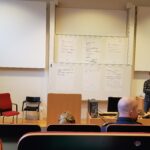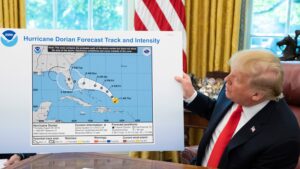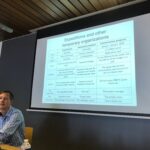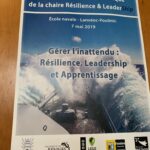Recently I founded Knowledge Forum Region North together with the participating organizations (see below). The aim of the knowledge forum is to share and reflect upon experiences, knowledge, and science, to increase society´s capability to cope with extreme events. Today the Knowledge forum consists of TripleEd, the Police, the Security Police, the military, and the county administrative board of Västerbotten. As we go along other organizations and researchers will be added. Really looking forward to what this initiative may turn into. There is certainly a need for some integration and reflections for all of us. The collaboration is thus quite exciting!
Author: admin
Workshop on Leadership challenges associated with extreme events
 There have been some developments that have not been written about… Both on a team and personal level. A major thing has been a workshop that TripleEd organized together with the Police, Security Police, the County administrative board of Västerbotten, and the defense forces – all representing the Northern Region of Sweden.
There have been some developments that have not been written about… Both on a team and personal level. A major thing has been a workshop that TripleEd organized together with the Police, Security Police, the County administrative board of Västerbotten, and the defense forces – all representing the Northern Region of Sweden.
For half a day we discussed and reflected on our different experiences of extreme events, and how they differed and was similar across the organizations. The day was organized with panel presentations, reflective team seminars, and joint discussions. Based on the feedback from the participants it was appreciated, and we all hope that we will see more of these activities and collaborations across organizations.
Talk about The Algorithms that we live by: using case studies to understand artificial intelligence
 Yesterday I had the privilege to talk at the AI-days at Umeå university. The talk was based on conversations with Jonny Holmström and Informatics. In the preparation for the talk it struck me how important this topic is for extreme contexts too. We are all too familiar with the fact that AI is transforming society as we know it since it is sneaking into every aspect of our lives (even those that we do not realize). But, more importantly, for extreme contexts it is highly relevant because AI is the basis for i.e. weather predictions (when a black marker is not involved), influencing voters and creating an increased polarization in society – to name but two examples.
Yesterday I had the privilege to talk at the AI-days at Umeå university. The talk was based on conversations with Jonny Holmström and Informatics. In the preparation for the talk it struck me how important this topic is for extreme contexts too. We are all too familiar with the fact that AI is transforming society as we know it since it is sneaking into every aspect of our lives (even those that we do not realize). But, more importantly, for extreme contexts it is highly relevant because AI is the basis for i.e. weather predictions (when a black marker is not involved), influencing voters and creating an increased polarization in society – to name but two examples.
The point of the talk is that there is little new and exciting about AI. It has been around for ages. But, it is indeed influencing our behaviors and we need to understand how. To be able to do this we need to start where we always should start: Humans and human behavior. One way is to have more nitty-gritty detailed case studies (and context sensitive methodologies).
Presentation at IAE in Nice
 I have the pleasure of spending a week at IEA by the invitation of Yvonne Giordano. In addition to exploring shared research interests and collaborations, I have given a talk on how I came to “explore the Extreme to understand the normal”. Trying to make sense of this was an interesting thought process, to say the least!
I have the pleasure of spending a week at IEA by the invitation of Yvonne Giordano. In addition to exploring shared research interests and collaborations, I have given a talk on how I came to “explore the Extreme to understand the normal”. Trying to make sense of this was an interesting thought process, to say the least!
Presenting at Ecole de Navale and the Chair of Resilience and LeaderShip
 Earlier this week I was invited by the Chair of Resilience and LeaderShip to give a presentation at Ecole de Navale in Brest. I talked about the research on Boredom on Mount Everest and how that is mitigated by organizational routines. The effect is a more cohesive and efficient team. It was a very interesting event with a mix of military, private/public organizations and scholars. Professor John Carroll of MIT also gave a talk about how to build resilient organizations out of a framework of organizational design, culture and politics. Other presenters included how French Special forces dealt with crisis situations and built their team cohesiveness. Interestingly, movie nights turned out to be universal between Sea to Summit.
Earlier this week I was invited by the Chair of Resilience and LeaderShip to give a presentation at Ecole de Navale in Brest. I talked about the research on Boredom on Mount Everest and how that is mitigated by organizational routines. The effect is a more cohesive and efficient team. It was a very interesting event with a mix of military, private/public organizations and scholars. Professor John Carroll of MIT also gave a talk about how to build resilient organizations out of a framework of organizational design, culture and politics. Other presenters included how French Special forces dealt with crisis situations and built their team cohesiveness. Interestingly, movie nights turned out to be universal between Sea to Summit.
Funding received for theory and method development related to the grand challenges
 Per and Eivor Wikströms stiftelse gracefully approved our application related to theory and method development in grand challenges associated with extreme contexts. The idea behind the program is to develop an exchange program with scholars in french speaking academic environments. The program is a continuation from the Riksbanken funded exchange program and will run during 2019.
Per and Eivor Wikströms stiftelse gracefully approved our application related to theory and method development in grand challenges associated with extreme contexts. The idea behind the program is to develop an exchange program with scholars in french speaking academic environments. The program is a continuation from the Riksbanken funded exchange program and will run during 2019.
Minor funding from USBE research institute
PUBLISHED: Buchanan & Hällgren – “Surviving a zombie apocalypse: Leadership configurations in extreme contexts”

David Buchanan and I just had our leadership article based on the zombie classic “Day of the Dead” by George Romero published in pre-print. Available at the journal of “Management Learning”. If you´d like a copy drop me an email…
Abstract
What can the classic zombie movie, Day of the Dead, tell us about leadership? In our analysis of this film, we explore leadership behaviours in an extreme context – a zombie apocalypse where survivors face persistent existential threat. Extreme context research presents methodological challenges, particularly with regard to fieldwork. The use of films as proxy case studies is one way in which to overcome these problems, and for researchers working in an interpretivist perspective, ‘social science fiction’ is increasingly used as a source of inspiration and ideas. The contribution of our analysis concerns highlighting the role of leadership configurations in extreme contexts, an approach not previously addressed in this field, but one that has greater explanatory power than current perspectives. In Day of the Dead, we observe several different configurations – patterns of leadership styles and behaviours – emerging, shifting and overlapping across the phases of the narrative, each with radically different consequences for the group of survivors. These observations suggest a speculative theory of leadership configurations and their implications in extreme contexts, for exploring further, with other methods.
Betygsnämnd; Caroline Ingvarsson “What´s next? Organising complex product development with lean”
Förra veckan var hektisk, satt också i en betygsnämnd på KTH för en avhandling skriven av Caroline Ingvarsson. Avhandlingen handlade om hur två stora företag organiserar sin produktutvecklingsverksamhet med hjälp av Lean och hur det arbetet tar sig faktiskt uttryck i vardagen. En välskriven avhandling gav en djupare förståelse för arbetet som hos mig väcker frågor såsom vad Lean egentligen är och hur olika metoder och modeller sprids i samhället till något som ibland är bortom igenkänning för att kunna fungera i den specifika miljön. Kommer osökt att tänka på Nils Brunssons “Mechanisms of Hope”.
Presenterade vid EGA-dagarna
 Häromveckan hade jag det stora nöjet att hålla ett föredrag vid “EGA-dagarna” för företaget EGA rörande “Riskhantering i Extrema miljöer”. Ett hundratal personer från främst byggindustrin deltog i det supertrevliga arrangemanget. De andra föreläsarna var väldigt intressanta och belyste mängder av aspekter kopplat till byggindustrin och dess säkerhet. Förhoppningsvis går det att spinna vidare på i någon form då det är en väldigt relevant fråga i en industrin som omsätter väldigt mycket pengar. En av aspekterna är intressant nog företeelsen att inte använda säkerhetsutrustning, vilket kan liknas vid sherpor på Everest som allt som oftast inte använder säkerhetslinor trots att det finns tillgängligt.
Häromveckan hade jag det stora nöjet att hålla ett föredrag vid “EGA-dagarna” för företaget EGA rörande “Riskhantering i Extrema miljöer”. Ett hundratal personer från främst byggindustrin deltog i det supertrevliga arrangemanget. De andra föreläsarna var väldigt intressanta och belyste mängder av aspekter kopplat till byggindustrin och dess säkerhet. Förhoppningsvis går det att spinna vidare på i någon form då det är en väldigt relevant fråga i en industrin som omsätter väldigt mycket pengar. En av aspekterna är intressant nog företeelsen att inte använda säkerhetsutrustning, vilket kan liknas vid sherpor på Everest som allt som oftast inte använder säkerhetslinor trots att det finns tillgängligt.